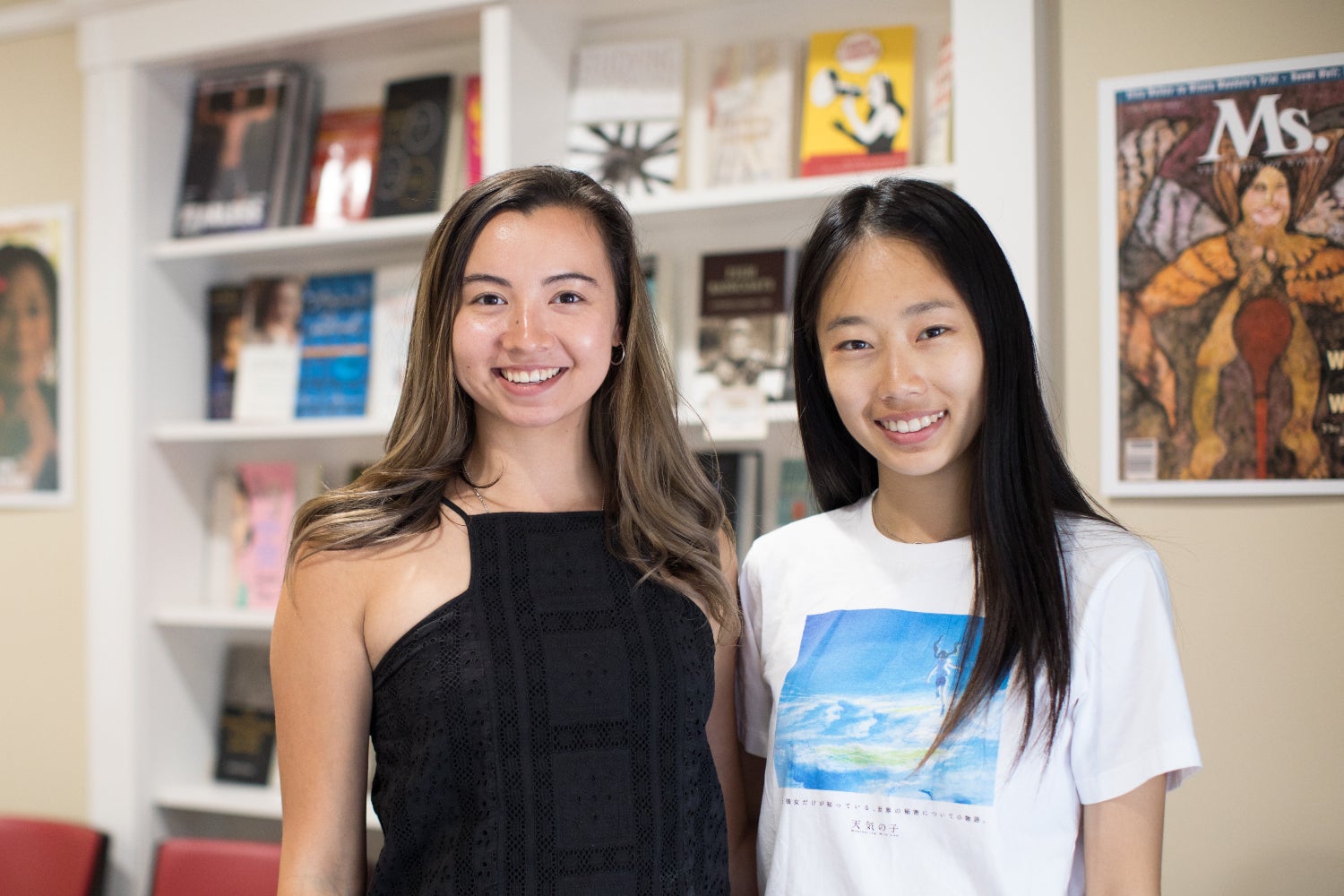Summertime at Stanford – a time for two rising seniors to do gender-related research
As Susan Heck Interns, Julia Pandolfo and Sophia Hu spent the summer working full time on their individual research projects at the Clayman Institute for Gender Research.
Throughout the summer, Sophia Hu started her day at her campus apartment in Rains House and steered her bicycle toward one of two destinations – Attneave House, home of Stanford’s Clayman Institute for Gender Research, and an acupuncture clinic in Palo Alto.

Anthropology majors Julia Pandolfo and Sophia Hu worked on individual research projects as Susan Heck Summer Interns at the Clayman Institute for Gender Research. (Image credit: Holly Hernandez)
Both destinations were related to the research she conducted at the Clayman Institute under its Susan Heck Summer Internship Program, an opportunity for students to work on their own gender-related research project and attend a weekly seminar.
Hu is an anthropology major in the School of Humanities and Sciences who is concentrating in medical anthropology, the study of how health and illness are shaped, experienced and understood in light of global, historical and political forces.
As a Susan Heck Intern, Hu interviewed people who sought treatment at Tiferes Medical Group, which practices traditional Chinese medicine, including acupuncture, cupping, massage, herbal medicine and nutrition.
Through her research project, Hu hopes to provide a more nuanced understanding of the person who chooses such alternative medicine for their health care.
Hu has many questions: What aspects of the alternative medicine do these patients accept and reject? What justifications do they use when making these distinctions? Who do they tell about visiting the clinic and who do they not feel comfortable telling?
Hu, who is from North Carolina, was one of two Stanford undergraduates selected as summer interns under the program, which honors Susan Heck (1941-2013), one of the institute’s founders.
Hu shared an office with fellow Susan Heck Intern Julia Pandolfo, an anthropology major from Toronto whose academic focus in the field is culture and society.
For her research project, Pandolfo investigated the question: Is the traditional system of mental health therapy failing Asian American women? In addition to reading the latest literature on the topic, she interviewed Asian Americans in three communities: Stanford students, Bay Area residents and members of a Buddhist meditation center in Milpitas.
Summer reading focused on gender
As interns, Hu and Pandolfo participated in Gender 101, a weekly seminar led by Michela Musto, a postdoctoral fellow at the institute. In addition to reading journal articles and book excerpts, they read the new memoir, Sissy: A Coming-Of-Gender Story, by Jacob Tobia.
“This summer, the readings focused on investigating how gender intersects with other forms of inequality, including race, class, age, sexuality, in education, work and families,” Musto said. “By introducing the interns to a variety of methodological and theoretical approaches to studying gender, Gender 101 complements the research they are already conducting.”
Musto said it was energizing to be around the Susan Heck Interns and the three other undergraduate summer interns at the Clayman Institute who also joined Gender 101.
“Most importantly, Gender 101 helps foster a sense of community among the interns,” she said. “Rather than spending the summer working in isolation from one another, our weekly meetings allow the summer interns to support and learn from one another. It also provides the Clayman Institute staff with additional opportunities to share insights about their experiences conducting gender research and guide the interns through their work.”
Learning new skills in a supportive community of gender scholars
Under the program, the Clayman Institute provided individual mentors to Hu and Pandolfo.
“Mentorship is core to what we do – and has been since 1974,” said Alison Dahl Crossley, associate director of the institute. “The Susan Heck Internship teaches students to conduct gender research, provides them with professional development opportunities and immerses them in the life of our interdisciplinary research institute.”
Hu, who will incorporate the research into her senior honors thesis, said the major new research skill she learned during the internship was coding, the painstaking process of identifying themes or patterns in her qualitative data – the interviews she had conducted with patients from the clinic.
“For about five of my interviews, my mentor and I would meet on a weekly basis to define codes, evaluate the ones I had created and make plans to identify new codes,” Hu said. “I was really challenged to think analytically about the kinds of themes and data I wanted to isolate from my interviews.”
Pandolfo, who plans to present her findings at the Symposia of Undergraduate Research and Public Service in the fall, said there were many small learning moments for her along the way, since it was the first time she had conducted her own research project from conception to presentation.
“Immersing myself in my research, I refined my ability to step away and look at the bigger picture when overcoming barriers or redirecting the very questions which drove my research forward,” she said. “I developed skills as an interviewer as well as a qualitative analyst, in addition to gaining a hands-on understanding of the type of work and thought which goes into each of the papers and books I read as part of my class work.”
Under the program, Stanford undergraduates work on research projects full time – 40 hours a week – for 10 weeks during the summer and receive a $7,500 stipend.
